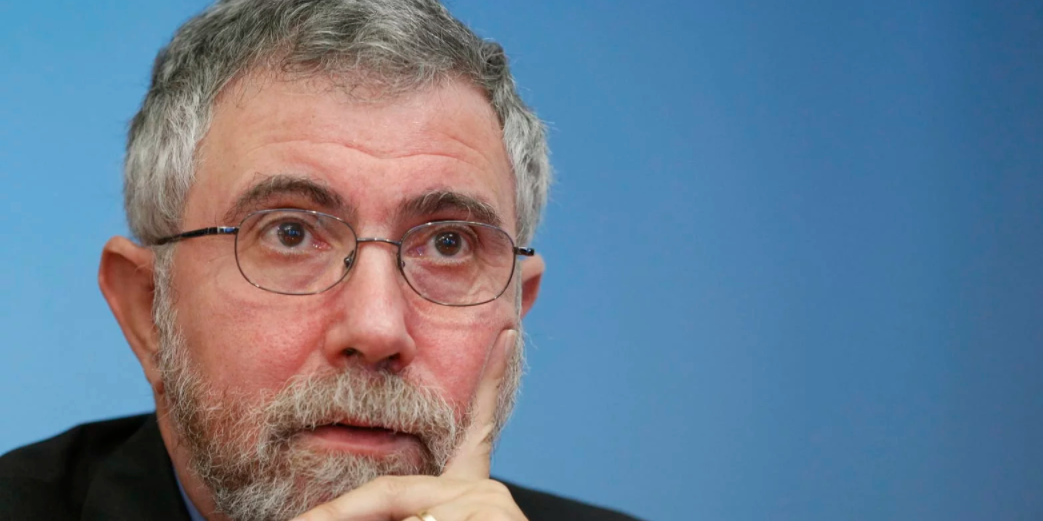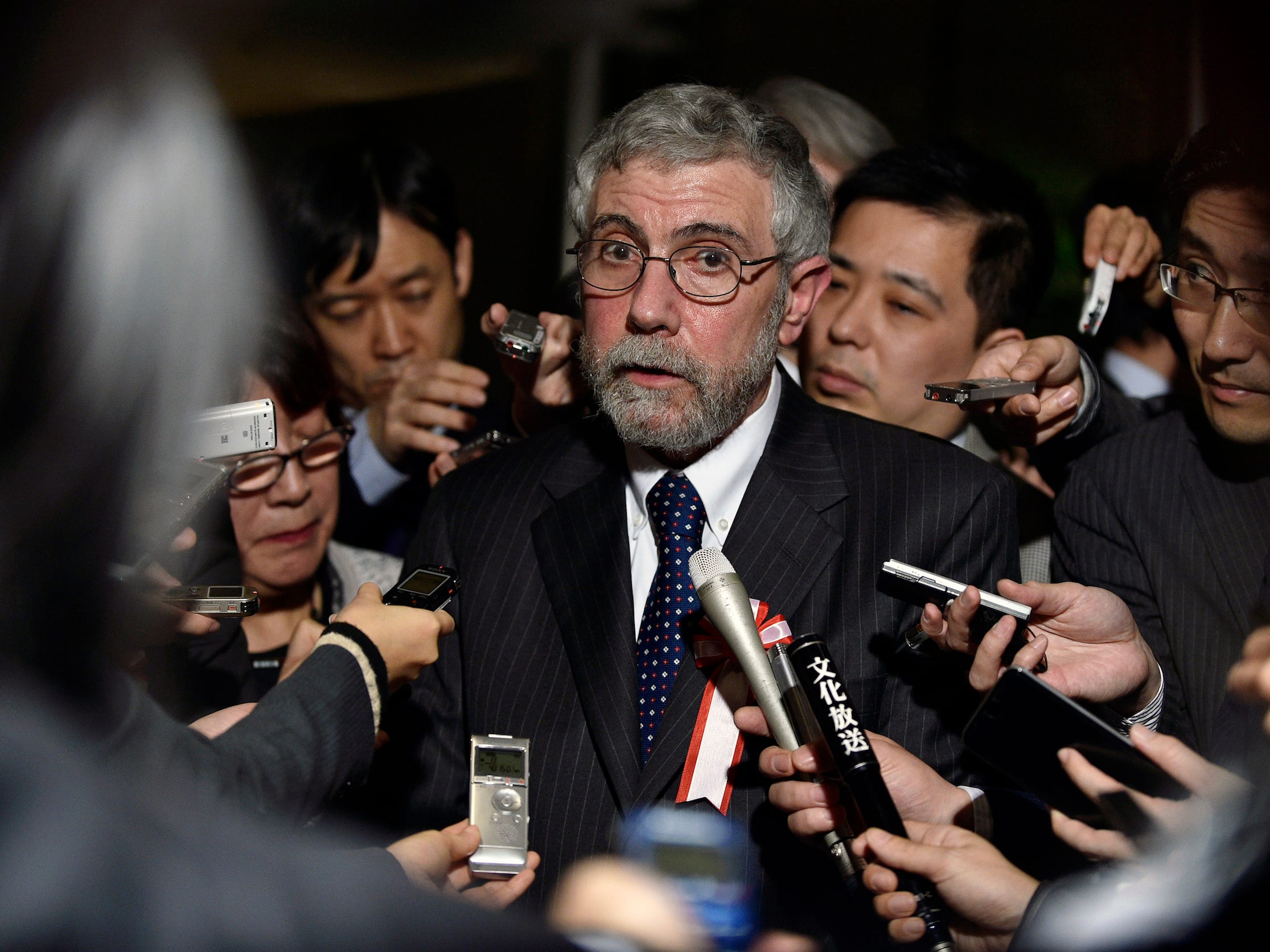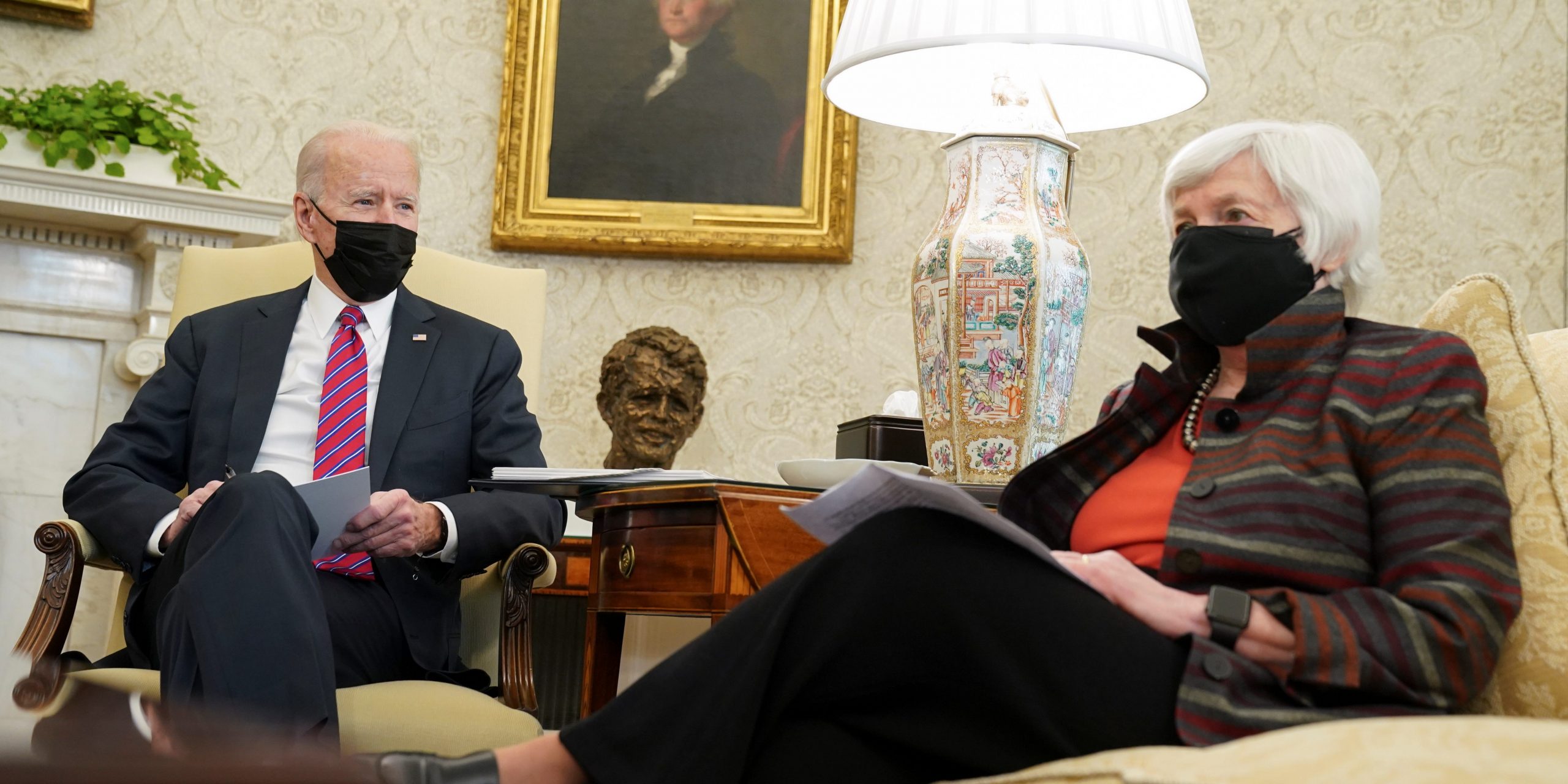
Brendan McDermid/Reuters
- Insider met with Nobel laureate Paul Krugman on Wednesday to discuss the US economy.
- Topics ranged from the Federal Reserve's rate strategy to the need to pay for Biden's spending plans.
- Presented below is a lightly edited transcript of the half-hour conversation.
- See more stories on Insider's business page.
Inflation. Multitrillion-dollar spending proposals. The Federal Reserve's rate strategy. The economic recovery in general.
There wasn't a lack of topics to discuss when Insider spoke with Paul Krugman, a Nobel laureate and the author of "Arguing With Zombies: Economics, Politics, and the Fight for a Better Future." Krugman is among the world's most prominent economists and has been outspoken in his thoughts on the recovery from the COVID-19 recession.
Presented below is a lightly edited transcript of the Wednesday conversation, in which Krugman addresses his biggest concerns around the rebound, what he's monitoring for possible inflation shocks, and the mistakes policymakers made over the past year, among other things.
Ben Winck, Economy Reporter at Insider:
Great to sit down and chat with you. The first question I'd like to ask is: How would you characterize the current inflation outlook?
In the inflation debate, we have people on one end arguing it's going to be transitory, and another group saying we risk seeing rampant inflation. Is either side winning yet?
Paul Krugman:
Well, no. I'm on the transitory side, although not with high certainty. There's the cliche about uncharted territory and all that, but it really is. Nothing like this has ever happened in the record.
But if you believe in the transitory thing, you're very much of the belief that you can expect to see some scary-looking numbers. You expect to see lumber prices soaring and shipping costs soaring for a little while. You expect to see bottlenecks and blips.
Basically, both sides are predicting the stuff that we're seeing now. Anyone who wasn't expecting to see some prices of some things rise as the economy came roaring out of the pandemic wasn't paying attention.
It's too early to tell, and it's going to take a while ... we don't know anything right at this point.
Insider:
The Fed has said it's going to look at headline inflation when it shows up, and that it's not going to look at forecasts or expectations. What are you watching for that first glimpse of broad inflation?
Krugman:
I'm going to be tracking this like everyone else. In the past, just the Fed's core inflation was good enough. I don't think that that will work this time, because we're gonna have special bottlenecks that will affect core prices as well.
I'm going to be looking at things like a couple of the Atlanta Fed indices. I'm going to be looking at sticky-price inflation. I'm going to be looking at trimmed-mean inflation, which would purge the bottleneck effects.
And to the extent that we can get information, wage contracts. It's going to be much harder than it used to be. A long time ago, long before you were born, we could do union contracts. There basically are no unions now, so that doesn't work anymore. But we'll be wanting to see if companies are building in the expectation of higher inflation into wage settlements.
The whole question is whether prices that are not changing all the time are being set with the expectation of inflation in the future. Whether we get this kind of leapfrogging process, which is what makes inflation - once embedded in the economy - hard to get rid of. Things like sticky-price inflation indices and trimmed-mean inflation indices are probably our best bet.
And, you know, talk to people. I'm going to be forcing myself to read the Beige Book these days, because I think, in some ways, it's going to be a better guide than the statistics are.
Insider:
As far as the Fed's updated inflation target, what do you think it means for the future of not just economic policy, but what we consider to be a strong economic recovery?
Krugman:
The tricky thing here is, the Fed has basically accepted that they kind of screwed up. That the 2% target ended up being a 2% ceiling, and that was not a good thing. They're not ready to go ahead and say, "actually 2% is too low." Although at some, at some level the arguments they're making would actually suggest that. That we have an economy with a low neutral real interest rate, which means, in order to have room to fight recessions when they happen, you actually want to have more inflation in the system.
The old judgment was that 2% inflation was enough to ensure that you would never hit the zero lower bound. Nobody can believe that now. But I don't know if they're ready to go there, and it's not clear that there's any contemplation of an inflation target high enough that we can consider ourselves immune to the kinds of crises we've had.
Insider:
This is the question that is on everyone's mind, but I'd be remiss if I didn't ask. Do you have any timeline in mind for when tapering would begin or if any rate hikes are going to arrive before 2023?
Krugman:
The probability is pretty high, that we'll hit the wall before then. Not hit the wall, because that's the wrong way to put it, but that you'll want to have some lift-off on interest rates.
If we're going to be growing at 8%, it doesn't take very long for us to an economy that is running extremely hot. Probably by the end of this year, we'll have a very hot economy.
Now, the thing that I would be that makes it confusing is that the stimulus is time-limited and we're getting this big slug of fiscal expansion. But it will be in the rearview mirror by sometime next year.
I think we're likely to have an economy that's looking hotter than is sustainable by early next year.
It seems likely that we'll have an economy that is overheated but in a very mild sense. Not in a scary sense, but nonetheless overheated by early next year. But we'll also be looking at a looming fiscal contraction because the American Rescue Plan will have done its thing already.
Whether the Fed will actually feel that it needs to raise rates is unclear for that reason. I think we're going to recover really fast. But the question is, are we going to be in a situation where the Fed feels that it needs to slam on the brakes over and above the deceleration that will come from the fact that the rescue plan is fading into the past.
Insider: Both the Fed's interest rate plans and Biden's spending proposals have been referred to as "experiments." What would you tell everyday Americans if you were to reassure them that the outlook is still positive and there's no reason to panic?
Krugman:
We've learned two lessons from the past dozen years. The US economy can in fact run a lot hotter than we thought. It is, in fact, okay to have nice things. We can have full employment and it doesn't mean that that hyperinflation is around the corner. And the debt doesn't seem to be a problem at anything near current levels.
So there's basically not much of a downside to having a very rapid economic recovery. If you're an ordinary American, you can say, "look, the odds are that by this time next year, jobs will be plentiful, things will be looking pretty good. Inflation might be a bit higher, but your income will be more than keeping up with it."
And nobody here is being stupid or responsible. They might be making mistakes because policymakers always do. But the whole discussion among policymakers is amazingly reality-based at this point. That's reassuring.
Insider:
I know it's still early and we're not out of the woods yet. But we've looked back and reflected on a lot of the mistakes that we made in 2008 and 2009. What mistakes, if any, are, do you see emerging from this recovery?

Krugman:
I have a funny concern, which a fair number of people that I've talked to have.
We're getting this big slug of money, a lot of which is still going out. Special props to Biden for ending the tyranny of cute acronyms. Instead of PATRIOT Acts and CARES acts, we now have "American" everything. The first American, well, most of that money has already gone out, and the economic effects will take some time to play out.
With the second two - the infrastructure plan and the family plan - I'm worried that they're excessively paid for. In principle, they're supposed to be fully paid for. But take what we knew about the economy in 2019. We were really kind of in secular-stagnation land with low neutral real rates. We had full employment then, it was only thanks to extremely low interest rates and persistent deficit spending.
What the doctor ordered is some sustained moderate deficit spending. So public investment - both in stuff and in people - was paid for in part by issuing debt. I'm a little worried that the Biden team seems to want to do these things with full pay-fors.
That's what worries me a little bit. That we're still too worried about fiscal responsibility and not sufficiently worried about persistent weakness of demand.
Insider:
So you'd argue, in this case, we should try to have our cake and eat it too?
Krugman:
Yeah, that's one way to put it.
I'm mixing metaphors here. We've got a lot of savings all dressed up with nowhere to go. That's basically the secular stagnation problem.
And when savings are all dressed up with nowhere to go, yes, there is a free lunch. Putting all these savings that businesses don't actually want to invest, even at very low interest rates, to work is just a win all around.
It's not reflected in that the numbers that they're throwing around, although there's reason to believe that the numbers are over-optimistic on the revenue side. And of course they know about this, no question. One of the weird things about right now is I'm actually talking to these people!
Anyway, being fiscally responsible is way down on the list of things you should be worrying about.
Insider:
Are there certain pay-fors that appeal to you more than others?
Krugman:
Greater IRS enforcement is a win all around. There seems to be a lot of money there and it's also a real element of fairness.
The corporate tax is also okay. I think we've learned that corporate taxes are not nearly the problem that we thought they are. And if we could actually get a crackdown on tax havens, that would be a really good thing as well.
It's not clear that we really are getting at the issue of untaxed gains from wealth. The attempts to tighten up taxation of capital gains look a little weak.
If it was up to me, I would say that the case for something like a wealth tax is still there. And it hasn't gotten any weaker from the facts. It's just that, with President Joe Manchin having veto power, lots of stuff doesn't really happen. But that's still something I'd like to see.
As for the rest, I'm not very concerned about the tax issues in general. I don't think we have a problem of paying for stuff. I also don't think the incentive effect of taxes are anything near as big as people imagine that they are. It's just a very low-passion issue for me.
Insider:
I'm not sensing a wholehearted endorsement of Modern Monetary Theory, but I'm catching some hints at that. Do you think the way we've handled this recovery is going to at least elevate the debate around MMT?

Kevin Lamarque/Reuters
Krugman:
I could do the old academic put down about MMT: There's much that's true, and there's much that's new, but what's true isn't new and what's new isn't true.
When people ask, "well, isn't this a vindication of MMT?" Well yeah, but it's also exactly what IS-LM macro would say.
I haven't seen people make this point: In the overheating debate, MMTers, at least if they're consistent with their own doctrine, are substantially to the right of people like me. Because I say, "Look, if the stimulus that comes out of the rescue plan is too big, that's okay. The Fed can tighten monetary policy and prevent an inflationary problem."
But the MMTers is don't seem to believe that monetary policy can ever be used for anything useful. We've actually had Stephanie Kelton saying you can't control inflation by raising interest rates.
I'm not sure I understand their doctrine, but if that's what you believe, then you should be very worried about excessive stimulus. Because their view is the only way to reign in inflation is to have a fiscal tightening. And since that's probably not in the cards, you should actually be very worried that the first round of fiscal stuff might be too big.
Whereas if you believe in conventional Keynesian macro, you say "yeah, well, but the fed can contain it by raising interest rates."
If you take this stuff seriously, MMT is actually something that would make you more cautious and less willing to go wholeheartedly into these progressive policies than if you were a conventional Keynesian.
Insider:
In that, you don't have the Fed to serve as that backstop?
Krugman:
That's right. From my point of view, you want to go big because it's asymmetric. If you go too small, then you hit the zero-lower-bound and, and the Fed can't help you if you go too small.
But if you go too big, the Fed can contain any overheating. If you have a doctrine that says monetary policy doesn't matter, then you don't have that asymmetry. So you don't have the argument for going really big. It's a really weird thing.
The two groups of people that are not all that political who I find the hardest to talk to are supporters of MMT and cryptocurrency.
Insider:
And I promise that cryptocurrency isn't on the docket today. The last question I wanted to ask is, what do you find most encouraging so far about this recovery? And what concerns you the most in the months ahead?
Krugman:
The most encouraging thing is there's no real sign of the scarring that people worried about. We're getting more than a few stories about businesses that aren't coming back, but there are new businesses being started and people seem to be eager to go back to work. Not enough to make companies that don't want to pay higher wages happy. But this whole thing is really looking like a V-shape recovery. That's a tremendously encouraging thing.
Five years after the fall of Lehman Brothers, we were still a high unemployment, depressed economy. It doesn't look extremely likely that's going to be the case five years after the coronavirus hit. So that's really good news.
Insider:
And your top concerns? We mentioned a few, but any others?
Krugman:
Well, I'm concerned obviously about a lot of things that are not economic. But, my main concern right now is that the world in 2023 will probably look a lot like the world in 2019.
The world in 2019, although we had full employment, was actually really fragile. Interest rates were close to zero and fiscal policy did not appear to be a useable tool. The virus broke a lot of the rules.
Back in 2019, I was saying to people: "I don't know where the next shock is coming from, but I think our shock absorbers are completely shot." What I'm afraid of is that we may find ourselves in that position again just a year or two down the road.
Insider:
Quick follow-up then. Does the Fed's change in language from "full employment" to "maximum employment" - looking at gaps across race, income level, and gender - give you any more hope toward how we pursue a higher labor market?
Krugman:
Some. It's nice to see that the Fed is keeping up. We're finally getting past the NAIRU. We're finally realizing we don't know how hot the economy could run, and the only way to find out is to try it. And the Fed has picked up on that, which is great.
But the Fed can always reign in a boom, but pushing on a string is still a real issue. I would be much happier if there were 16 members in the Senate who talked the way the Fed does. It matters a lot more, whether the legislative branch is willing to think in those terms than whether some people who fundamentally control short-term interest rates believe in those things.
Insider:
I think it's a great place to conclude. Thank you so much. Really appreciate you making the time. It's been a privilege to chat.
